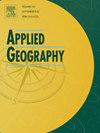智慧城市主义的语境化:数字化世界中智慧与幸福的新兴地理
IF 5.4
2区 地球科学
Q1 GEOGRAPHY
引用次数: 0
摘要
流行的智慧城市主义叙事通常基于这样一个前提,即通过无处不在的技术实现智慧城市的增长是不可避免的,并且是脱离背景的,智能的提高可以提高效率和幸福感。这项研究考察了全球113个城市的空间智慧-幸福的变化,揭示了偏离正常预期的模式。我们对城市层面数据的回归分析揭示了不同地区条件下不同的智慧-幸福关系,全球北部城市观察到更强的正相关,而全球南部城市则发现了较弱的非线性模式,包括南美洲的负相关。进一步的分析探讨了城市智慧的具体组成部分对城市幸福感的影响,确定了城市结构特征,如城市基础设施条件和服务提供,是一个显著的正向预测因子。与普遍的看法相反,科技与幸福感整体呈负相关,且存在显著的地区差异。智慧城市——普遍被宣传为地方推广的国家治理的旗帜和体现——仍然深深植根于地方特定的区域条件,这意味着需要超越技术确定性的心态,认真考虑城市的地方性和以人为本的考虑。本文章由计算机程序翻译,如有差异,请以英文原文为准。
Contextualizing smart urbanism: Emergent geography of smartness and happiness in a digitalizing world
The prevalent smart urbanism narratives commonly rest on the premise that the growth of smart cities through ubiquitous technologies is inevitable and decontextualized, with increased smartness improving efficiency and happiness. This study examines the spatial smartness-happiness variation among 113 cities worldwide, revealing patterns deviating from normal expectations. Our regression analysis of city-level data reveals diverse smartness-happiness relationships contingent upon varying regional conditions, with a stronger and positive correlation observed from the cities of the Global North and a weaker and non-linear pattern identified in the Global South including a negative association found from South America. Further analysis explores the impact of specific components of urban smartness on urban happiness, identifying urban structural characteristics, such as urban infrastructure conditions and service provision, as a significant positive predictor. Contrary to popular belief, technology displays an overall negative correlation with happiness with significant regional variations. Smart cities—universally promulgated as the banner and embodiment of state governmentality for place promotion—remain deeply embedded in place-specific regional conditions, implying the need to go beyond a technologically deterministic mentality and take on board seriously cities’ locality and human-centered considerations.
求助全文
通过发布文献求助,成功后即可免费获取论文全文。
去求助
来源期刊

Applied Geography
GEOGRAPHY-
CiteScore
8.00
自引率
2.00%
发文量
134
期刊介绍:
Applied Geography is a journal devoted to the publication of research which utilizes geographic approaches (human, physical, nature-society and GIScience) to resolve human problems that have a spatial dimension. These problems may be related to the assessment, management and allocation of the world physical and/or human resources. The underlying rationale of the journal is that only through a clear understanding of the relevant societal, physical, and coupled natural-humans systems can we resolve such problems. Papers are invited on any theme involving the application of geographical theory and methodology in the resolution of human problems.
 求助内容:
求助内容: 应助结果提醒方式:
应助结果提醒方式:


